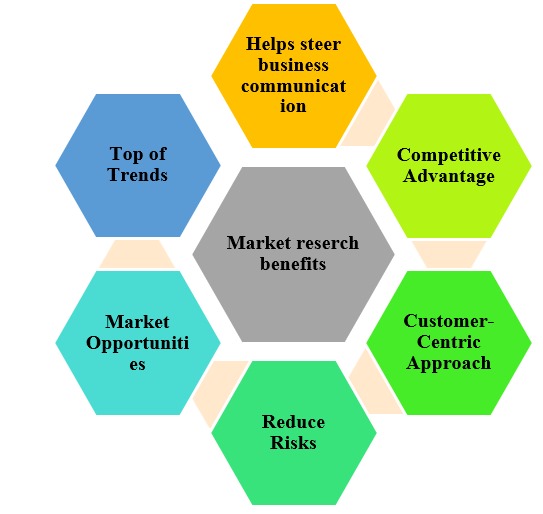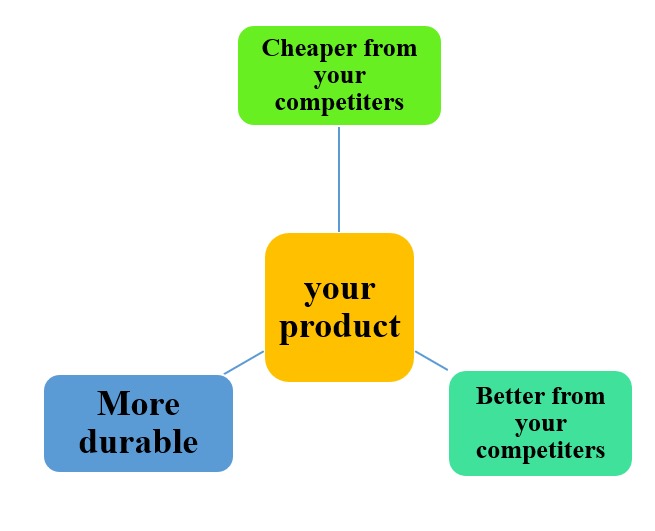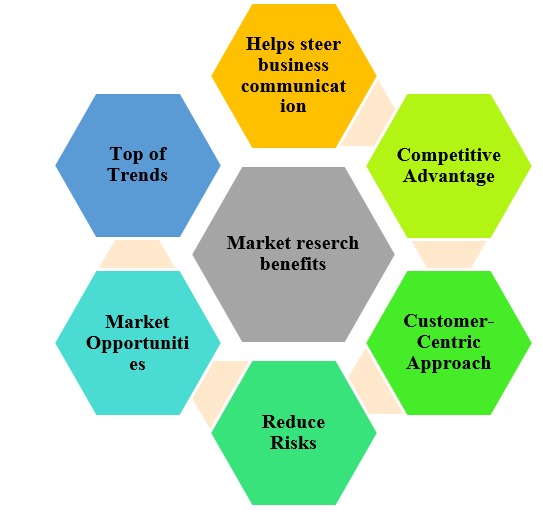Benefits of Market Research
Market research means familiarizing oneself with a business’s target market and gathering feedback from focus groups. Integrating important insights into client habits and upcoming prospects ultimately depends on an in-depth comprehension of market research. Market research plays a crucial role in attaining growth and mitigating business risk.
Market research is relevant to various departments within a business, such as business planning and strategy groups, finance, sales, marketing, and product creation. No company has ever achieved significant growth without undergoing the careful method of conducting market research in their industry. Market research offers numerous advantages, which can be customized to align with an organization’s distinct business goals. Market research enables companies to enhance their understanding of competition and identify potential avenues for growth. This blog will outline the 10 most compelling reasons for incorporating market research into every organization.

1.Helps steer business communication
Market analysis enables companies to better understand the optimal timing and manner in which to engage with their clients. It can assist in avoiding conflicting messages and ensuring that company communications are not misunderstood or misinterpreted. Optimal communication strategies can be developed for both existing and prospective clients after analyzing the findings of market research. You will possess complete knowledge of their preferences, inclinations, and sensory preferences.
Marketing research may also identify customers’ anticipated communication from a company and aid in understanding their sentiments when such expectations are not fulfilled. Market research enhances communication efficacy for all individuals.
2. Gain a Competitive Advantage
Market research is a crucial instrument for comparing and analyzing competition in a market characterized by continuous variations. Utilizing direct, indirect, and ideal rivals for benchmarking is crucial, as it allows for assessing areas of improvement and exploiting them for marketing purposes. For instance, if a company conducts market research and finds that its pricing is considerably cheaper than those of its competitors, it may indicate the need to increase prices or use its competitive advantage in its marketing plan.

3.Maintain a Customer-Centric Approach
Market research involves acquiring an improved understanding of what customers want, which is a crucial measure in establishing a customer-centric company. Gaining insight into client preferences is crucial for enterprises. Market research enables firms to acquire useful insights regarding client preferences, behaviours, and the obstacles they encounter. Customer-centric firms prioritize the customer experience as their primary focus. Studies have demonstrated that businesses that prioritize the needs and preferences of their customers are 60% more financially successful. Placing the customer’s requirements and goals as a top priority is a proven formula for achieving success.
The first step in gaining an understanding of those requirements and goals, as well as other significant features of your target clients, is to conduct market research by gathering information about them. Understanding your consumers is essential to successfully building a firm that is focused on the needs of its customers. When you perform market research, you can appeal more closely to the preferences and pain areas of your clients. It is beneficial to both the consumers and your company in equal measure.
4. Reduce Risks by Testing Concepts
No business effort does not involve some degree of risk. If enterprises do not engage in risk-taking, they will severely restrict the opportunities for gain. Successful organizations, on the other hand, typically employ strategic methods to reduce the risks they face. Taking no action at all is the best method to avoid taking any kind of danger. When it comes to minimizing risks and maximizing returns, organizations should instead make use of market research.
Improved interaction is one thing, but maybe even more significant is having a thorough grasp of the potential risks that are present in the market and effectively managing those risks. Organizations that are forward-thinking in their business practices are aware that some of the most significant market research may involve the possibility of losing money.
Furthermore, it is important to keep in mind that individuals who are part of an intended audience are human and are prone to changing their opinions over time. When businesses fail to take into account the changing opinions of their customers, they expose themselves to a significant amount of danger. An efficient market analysis can help these businesses maintain a connection with the audiences they are trying to reach.
5. Identify the Market Opportunities
For each good or service that you introduce to the marketplace, there are usually at least a dozen more that are offered by competitors. This is because there is a great deal of competition in the marketplace. To make matters even worse, it is difficult to anticipate the wants of consumers based solely on the functionality of a product.
Carrying out market research regularly might assist you in identifying new chances for growth and further development. Any company that can predict the requirements and prospects of the market before others will have an advantage over its competitors. Research on the market can aid in the identification of developing trends, which enables businesses to, for instance, create new items to satisfy the requirements of new customers. Culture, natural occurrences, technological advancements, and a great number of other factors all play a role in shaping market patterns around the world.
6. Stay on Top of Trends
Research on the market is not only essential for newly established companies. Companies are required to develop to optimize the method in which they connect to clients as consumers continue to evolve. The conduct of market research is an effective method for keeping abreast of pertinent trends. Secondary research is frequently an effective method for conducting studies on trends. When it comes to new product characteristics, for instance, industry studies or research conducted by your competitors can provide insight into what customers are interested in.
It is necessary to conduct market studies if you wish to keep up with the rapid changes that are occurring in today’s culture. To stay on top of trends concerning the purchase behaviour of your customers, the most prominent advertising channels, preferences for product packaging, product characteristics, and appropriate messaging, among other things, you need to continually educate yourself. A plan that involves imitating what your opponent accomplished the previous year is not a good one.
7. Help to define a brand promise
guarantees of the exceptional quality of a good, such as computers or automobiles, as well as guarantees of the timeliness and effectiveness of service, such as food orders, are examples of the types of promises that are specified by several brands, ranging from huge, widely recognized names to small, independent companies. These promises made by the brand are extremely diverse and depend on the good or service that is being promised to clients as well as how it will be delivered.
According to the good or service that is being promised to customers and how it will be provided, these brand commitments might vary dramatically. The brand promise must be uncomplicated, and conducting research can be of use in defining the brand’s promise and figuring out which approach is the most appealing.
8. Save Time and Money
Geoff Cudd, the Founder of Don’t Do It Yourself, a site that offers guidance and evaluations to assist individuals in selecting the most suitable freelancers and tools for business expansion, stated that focused efforts are consistently more efficient than broad ones. Through the use of market research, one can effectively prevent the squandering of resources and funds on promotional and marketing efforts that fail to reach the intended target audience. Alternatively, you might allocate your resources towards implementing tactics that have been empirically demonstrated to yield positive results with your particular target demographic. This will enable you to maximize cost-effectiveness and optimize resource use.
9. Monitors market position over time
While you might be currently performing well, your future performance is uncertain. This has been the situation for enterprises since the beginning of human existence, and it will always remain accurate. Market research allows you to ascertain your market positioning in the thoughts of your most significant stakeholders: customers. Thorough market research enables you to comprehend the perception of your clients towards your business.
A market research project may additionally determine your clients’ perceptions of your marketing activities. Humorous, derogatory, and disconnected from reality, one can easily recall companies with marketing efforts that have reflected any of those characteristics. Marketing research ensures that you are consistently held in high esteem. Engaging in research involves more than simply posing inquiries on your own. A prosperous enterprise will possess the capability to derive insights from data that has been collected by others. The key factor is to ensure that you consistently uphold your brand’s commitment.
10. Estimates sales and fully utilizes advertising expenditure
Additionally, take into consideration how market research assists firms in allocating resources for the advertising of a novel service or good. Investing in market research is beneficial to any budget.
Consider the following scenario: you are shopping at the supermarket and you notice that the price of peanut butter has increased. This straightforward observation is what we refer to as market research, and it will enable you to spend dollars in a manner that is acceptable for your subsequent trip to the grocery store. Through doing market research, it is possible to forecast the sales of a new product or service, which enables you to allocate the necessary advertising budget to achieve maximum earnings.
When it comes to budgeting and advertising, it is clear that resources for market research can be really useful. The results of the study provide the organization with the ability to establish sales goals that are attainable and to direct their advertising budget toward channels that can successfully reach their intended audience.
FAQS:
Q1. How companies can gain competitive advantage through market research?
Ans. If a company conducts market research and discovers that its pricing is considerably cheaper than those of its competitors, it may indicate the need to increase prices or use its competitive advantage in its marketing plan.
Q2. How is market research conducted?
Ans. Before releasing new products, companies study the market to see if the products will appeal to consumers. Questionnaires, phone interviews, and focus groups are examples of tools. The final product design and its positioning in the market are influenced by the findings of market research.
Q3. What are the 4 major ways of conducting market research?
Ans. There are many ways to gather consumer information and perform market research; you are not restricted to using a single technique. Surveys, interviews, focus groups, and customer observation are the four main categories of market research methods.
Q4. What is the scope of marketing research?
Ans. As a business professional, you will analyse your competition, grasp the wants and preferences of your clients, and spot business possibilities by using market research to acquire insights into the marketplace environment. Customer research is one of the main focuses of market research.
Q5. How good market research leads to success of business?
Ans. Informed decisions are the foundation of successful businesses. Market research provides data-driven insights that aid in identifying opportunities, mitigating risks, and shaping strategic plans. Market research supports decision-making, whether launching new products, entering new markets, or changing business models.

